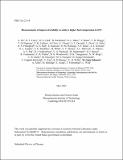Measurements of improved stability to achieve higher fuel compression in ICF
Author(s)
Do, A.; Casey, D.T.; Clark, D.S.; Bachman, B.; Baker, K.L.; Braun, T.; Briggs, T.M.; Chapman, T.D.; Celliers, P.M.; Chen, H.; Choate, C.; Dewald, E.L.; Divol, L.; Fathi, G.; Fittinghoff, D.N.; Hall, G.N.; Hartouni, E.; Holunga, D.M.; Khan, S.F.; Kritcher, A.L.; Landen, O.L.; MacPhee, A.G.; Millot, M.; Marley, E.V.; Milovich, J.L.; Nikroo, A.; Pak, A.E.; Schlossberg, D.J.; Smalyuk, V.A.; Stadermann, M.; Strozzi, D.J.; Tommasini, R.; Weber, C.R.; Woodworth, B.N.; Yanagisawa, D.K.; Birge, N.W.; Danly, C.R.; Durocher, M.; Freeman, M.S.; Geppert-Kleinrath, H.; Geppert-Kleinrath, V.; Kim, Y.; Meaney, K.D.; Wilde, C.H.; Gatu Johnson, Maria; Allen, A.; Ratledge, M.; Kong, C.; Fehrenbach, T.; Wild, C.; ... Show more Show less
Download23ja014_full.pdf (1.738Mb)
Metadata
Show full item recordAbstract
While nuclear fusion ignition has been achieved at the National Ignition Facility (NIF) in inertial confinement fusion (ICF) experiments, obtaining higher gain and more efficient burn is still desired. In that regard, increasing the compression of the fuel is an important factor. In recent indirect-drive capsule implosions, the SQ-n campaign is testing the hypothesis that reducing the hydrodynamic growth of perturbations is key to achieving higher compression of high-density carbon (HDC) based-ablators for ICF. SQ-n uses a design at lower adiabat with a ramped foot laser pulse shape to minimize early-time hydrodynamic instability growth, predicted to be reduced by a factor of 10, and an optimized ablator dopant distribution. Subsets of experiments were conducted within the SQ-n campaign to study the implosion symmetry, laser backscatter, stability, and compression. Only the latter two will be reviewed here. Shock timing experiments using the VISAR diagnostic enabled the development of a gently accelerating shock velocity. The ice-ablator interface acceleration, important for managing the Richtmyer-Meshkov phase growth, was observed with refraction enhanced radiography (RER) and the ablation front growth was measured using radiography of pre-imposed modulations. Finally, layered THD and DT implosions demonstrate that between 15%+/-3% and 30%+/-6% improved compression has been achieved.
Description
Submitted for publication in Physics of Plasmas
Date issued
2023-05Department
Massachusetts Institute of Technology. Plasma Science and Fusion CenterJournal
Physics of Plasmas
Publisher
AIP
Other identifiers
23ja014